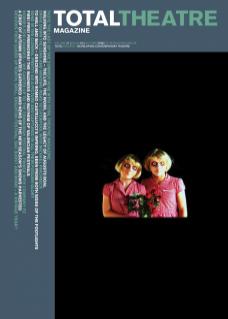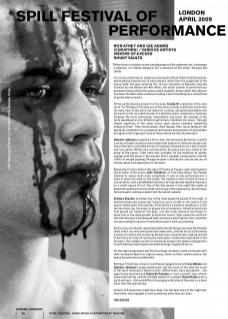‘When horror is subject to the transfiguration of the authentic art, it becomes a pleasure, an intense pleasure, but a pleasure all the same.’ Georges Batailles
It’s not too often that an audience entering the Shunt Vaults find themselves dominated by experiences of performance rather than the magnitude of the space itself. Yet upon entering this 12-hour marathon of Batailles inspired curation by Lee Adams and Ron Athey, the sheer number of performances presented ensured that the space acted as gothic frame rather than devouring maw, the dark stone arches providing a stern backdrop to a varied host of performed artworks.
Of the performances present in this area, Franko B’s variation of the new work I’m Thinking of You was one of the most striking. A different performer for each hour of the piece sat naked on a swing, swinging backwards and forwards to the recorded sounds of a plaintive piano composition by Helen Ottaway. By turns entrancing, melancholic and warm, the wonder of the work developed as the different performers inhabited the piece. Through simple repetition of the same action each person revealed something unique to them. Their nervousness, their beauty, their joy at being on the swing all combined into a poignant and honest presentation of personality set against the lingering traces of those whom we had already seen.
Dominic Johnson presented a three-hour durational performance in which a series of bodily invasions were made with objects of reflective material as he performed a controlled series of ritualistic movements on a pile of earth and rose petals. Whilst also very beautiful, the piece was less suited to the setup of the space. Little room was available for the audience to quietly engage with the piece in the manner that it needed; conversation and the traffic of people passing through became a distraction and forced our attention away from absorption in the work.
Beginning 12 hours before the start of Visions of Excess, and continuing for the duration of the event, Julie Tolentino’s A True Story About Two People claimed its space much more completely. A one-to-one performance in a cube of glass mirrored on the inside, the audience were invited to have a conversation with a blindfolded Tolentino as they danced together barefoot on a small square of turf. One of the few pieces in the night that really allowed the audience to have total control over their experience, the intimacy here proved a calming respite from the tumult outside.
Zackary Drucker provided one of the most powerful pieces of the night. A feminine body was presented, lying face up on a table in the centre of the space, naked apart from panties. Directed by a voiceover speaking in a Californian drawl we, the eager to please live art audience, moved forward and first placed our hands on the body, and then took tweezers and began to pluck four or five days growth of body hair from it. Next came the confirmation that this was a transsexual body we were snatching hair from, and then we were asked to vent our frustrations upon it with our plucking.
As the voice continued, repeating claims that this body can never be a female body, that it can only ever grow more masculine, and that all art is derivative, a sense of violent and unnatural decline was conjured and, looking around at the hoard of vultures tearing this body apart, we became implicated in the brutality. The sudden switch of emotional states from gleeful engagement to self-loathing and disgust provoked feelings of genuine horror.
As the night progressed and the stunningly dressed crowd continued with their excessive desire to capture every vision on their camera phone, the space became more problematic.
Perhaps if I had been closer I could have engaged more with Lee Adams and Dominic Johnson’s stage-based work, but too much of the time too much of the work remained a distant vision. Whilst there were exceptions – the opportunity provided by L Gabrielle Penabaz to ‘marry myself’ was refreshingly entertaining, and the multiple talents of compère David Hoyle were a joy to witness – it proved difficult to engage with some of the work on a level other than the spectacular.
Visions of Excess they might have been, but the best work of the night was that which was engaged in with something other than our eyes.

